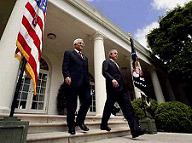
An historic event took place in Washington Thursday with United States President George W. Bush meeting with Palestinian President Mahmoud Abbas. It was not only Abbas’ first visit to the White House since his election in January, but it was also Bush’s first meeting with a Palestinian leader since repeatedly refusing to meet with Abbas’ predecessor, the late Yasser Arafat. With rapidly changing events on the ground between Israel and the Palestinians, this visit hopefully aimed to secure commitments to, movements toward and assistance with the flagging peace process. While strong statements were voiced, only time will tell if they were just another instance of lip service or an actual step forward toward a viable and lasting solution.
“Israel should not undertake any activity that contravenes road map obligations or prejudice final status negotiations with regard to Gaza, the West Bank and Jerusalem. Therefore Israel must remove unauthorized outposts and stop settlement expansion,” Bush said during a joint press conference in the Rose Garden. “The barrier being erected by Israel as part of its security rather than a political barrier, and its route should take into account, consistent with security needs, its impact on Palestinians not engaged in terrorist activities.”
These statements are welcomed and a modest step in the right direction. However, the disappointment for Palestinians comes with the ambiguity of concrete help from the U.S., something Abbas desperately needs in order to show firm results and improvements in the daily lives of Palestinians. This point is especially crucial in the upcoming legislative elections, scheduled for July, in which Abbas and the Fateh party are vying for power with Hamas. The closeness of the race not only indicates a switch in power over the desire for significant change, but it also signals religious versus secular government questions and debates.
“We must end the Israeli-Palestinian conflict before it is too late,” Abbas said, stressing the danger of Israel’s continuance of settlement expansion and the Annexation Wall construction. “Time is becoming our greatest enemy.”
Although Bush has previously said that he envisions the creation of an independent Palestinian state by the time he leaves office in January 2009, he rejected Abbas’ appeal to move more rapidly toward final status negotiations, such as water, borders, refugees and Jerusalem, which would lead up to the establishment of a Palestinian state. In essence, Bush is double-talking and ignoring the “time” issue that is so critical, considering Israel’s land grab tactics and isolation of Palestinians within the region.
“With concrete actions by the United States, the Palestinians, Israel and other nations, we can transform this opportunity into real momentum,” Bush said.
The key word here is concrete actions. Thus far, these have been vocalized, but never materialized. If Bush and the U.S. are serious, they must put serious pressure on Israel to comply with peace agreements – something it has yet to do during the previous decades of conflict – and impose consequences, whether through sanctions, a freeze on economic assistance, etc., if it fails to comply.
Another major outcome of Bush and Abbas’ momentous meeting was the U.S. pledge of 50 million dollars to be given to the Palestinian Finance Ministry for Gaza projects after Israel’s disengagement this summer. The financial aid, which comes from previously budgeted but unspent money, will go toward housing, roads, schools and health clinics. However, this small gesture to improve Palestinian infrastructure will only be beneficial if the U.S. can prevent Israel from reverting back to its ruthless occupation policies and invasions, which destroy what Palestinians are forced to continuously build up.
While this White House visit was symbolically significant, it can only prove to be progressive and historical when results and peace become visible. Words and promises are good, but true power and respect comes from action. As Abbas pointed out in his speech, occupation and the absence of freedom must cease for security, peace and democracy to flourish for both Israelis and Palestinians.







